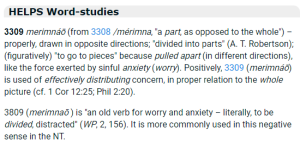Recap from last week’s teaching on anxiety and trust
Matthew 6:31-33
- To whom was Jesus speaking when he gave this teaching?
- Why do the Gentiles seek after all these things (Matthew 6:32)?
- What does your heavenly Father know (Matthew 6:32)?
- Why does Jesus remind his disciples of this?
Teaching on Judging
Note on word usage
The Greek word krino means to judge or to decide. The underlying concept is that of separating one thing from another, e.g. separating wheat from chaff. So, it’s really about examining something to assess its worth, or making a judgment (assessment) about the truth of a situation. For an example of this usage, see Jesus’ response to Simon the Pharisee in Luke 7:41-43 (make sure to read right to the end of verse 43).
The word krino came to be used in the context of the legal function of judging, which is legitimate and necessary when exercised properly. In this context it’s an aspect of rulership or proper governance. Rulers have to make judgments about what is right and wrong. See Deuteronomy 16:18, Matthew 19:28.
See Hebrews 5:14. The word for “discernment” is diakrisis and is related to the word for judging used in Matthew 7. Based on this verse, what character quality might qualify one to exercise legitimate judgment over others?
See also 1 Peter 5:2-3. The verb poimen (to shepherd) is used here, but it carries the same connotation of exercising authority for the good of others, which includes the requirement of correcting (judging) but should be exercised with humility.
In today’s verses from Matthew 7, Jesus is commenting on the common human tendency to judge others illegitimately.
Matthew 7:1-2
- What is Jesus’ point here? See Luke 6:37-38, James 5:9
- Who is the righteous Judge?
Matthew 7:3-4
- How would you answer Jesus’ question in Matthew 7:3?
- What is the remedy for this affliction? See Luke 18:9-14
Matthew 7:5
- What character quality is required in order to take the log out of your own eye?
- Are we always able do this by ourselves, or do we sometimes need help with it?
Matthew 7:6
- What is Jesus getting at in this saying?
- What is the connection with the teaching on judging?
For further reflection
In chapter 3 of 1 Corinthians, Paul is commenting on the tendency among the Corinthian church to compare his ministry to that of other apostles.
His response is that the most important criterion in evaluating an apostle is that of faithfulness. See 1 Corinthians 4:1-2.
He then follows up with this brilliant commentary on judging. See 1 Corinthians 4:3-5.
- What is Paul’s point here?




